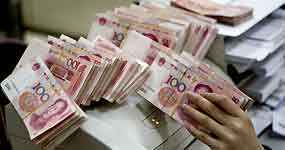
尽管华盛顿人人都认为人民币应升值,但不是每一个中国人都这么想。难道中国人是对的?毕竟,将贸易失衡归咎于他国操纵汇率的阴谋诡计是很容易的。上世纪80年代,日本庞大的盈余被认为是蓄意低估日元的结果。但尽管后来日元大幅升值——这一点从上周日本央行(BoJ)决定干预汇市以压低日元就可看出——该国盈余仍在顽强地增长。
现在引起美国政府愤怒的对象变成了中国。美国正确地认识到,在21世纪,自己的国际竞争对手是中国,这也是中国政府不愿屈服于美国政府要求的原因之一。但中国的不情愿还反映出了一些更有理的疑虑。美国财长蒂姆•盖特纳(Tim Geithner)上周在国会作证时,清楚地表达出了这样一种常规智慧:人民币低估"有利于中国的出口行业,同时意味着,中国的进口成本要高于其应有的水平",由此导致国内消费偏低。这一论断假定,名义汇率的改变会导致竞争力出现持久的调整,进而将缓和当前的全球失衡。但这两个假定都存在严重的缺陷。
关于第一个假定,中国人均收入仍十分低,年均收入约为3000美元,相比之下,美国为4万美元。两者之间的差距正缓慢缩小,是因为中国新的开放政策吸引了高质量资本和管理,加之异常廉价的劳动力过剩,让中国极具竞争力。换言之,中国在国际贸易中比重渐增,与人民币低估毫无关系。
此外,人民币即使升值,也改变不了中国的竞争地位。中国最严峻的资源配置失衡,是劳动力利用率不高。中国几乎取之不竭的穷困农民工资源,限制了工资水平上涨的速度——略高一些的工资将更多的劳动力吸引到繁荣发展的城市,进而限制了工资水平进一步上涨。人民币一旦升值,这些限制将变得愈发明显,暂时丧失的出口竞争力将被国内工资下降所抵消。因此,中国领导人的说法是对的,即人民币升值除了极短期之外不会有什么效果,从长期来看还将伤害中国的劳动力。
第二个假定同样站不住脚。诚然,政策制定者一直设法通过调整汇率来实现经济"再平衡"。日本上世纪80年代曾进行过尝试,但随着出口放缓,其经济走向繁荣,为80年代末出现的泡沫和之后的通缩式停滞埋下了祸根。2008年,英镑贬值,但英国的贸易表现仍很糟糕。中国完全可以援引这两个例子中的任何一个,作为自己拒绝动作过大的理由。
但是,中国外汇储备大幅增加,难道证明不了中国正在操纵人民币汇率?即使在这一点上,我也无法确定。中国很可能希望将所持美国债务转换为范围更广的资产,包括美国公司。但美国国会对此热情少得不能再少。的确,由于美国众议院往往以国家安全为由,阻止中方收购美国企业,中国几乎只能将其盈余投入美元资产。
由于目前中国是全球第二大经济体,人民币升值必然意味着美元贬值。因此,归根结底,将美国的汇率政策形容为美元贬值政策(而不是推动人民币升值)可能更准确些,它反映出的不是美国贸易困难,而是其债务过多。美元一旦贬值,为支持美国金融体系而发售的各种国债的价值,按人民币计算都将大幅下跌。而在中国人看来,这看上去会十分可疑,像是一种违约。难怪他们不愿意让人民币升值。
那么,我们能做些什么?美国应收回其保护主义腔调越来越浓的言论。美国人不应忘记,正是由于中国等债权国的雄厚财力,才使美国的财政刺激成为可能。制裁只会让世界陷入愈演愈烈的保护主义、汇率动荡和利率冲击。
因此,美国最好认识到,美中两个超级大国之间相互依存的关系,让这种威胁适得其反。此外,美国应与中国政府合作,推动中国国内经济亟需的社会保障和消费者信用改革。除非实现这一切,并让中国家庭学会消费,而非只知道储蓄,否则中国的经常账户盈余是不会消失的,不论人民币汇率最终是多少。
本文作者为汇丰银行(HSBC)首席经济学家,著有《丧失话事权:西方繁荣面对的新兴威胁》(Losing Control: The emerging threats to western prosperity)
译者/陈云飞
http://www.ftchinese.com/story/001034733

W hile everyone in Washington thinks the renminbi should be revalued, not everyone in China agrees. Maybe the Chinese are right? It is, after all, easy to blame trade imbalances on the evil exchange rate machinations of others. In the mid-1980s Japan's surplus was supposedly the consequence of a deliberately undervalued yen. But while the yen has since risen a good deal – as shown by last week's decision by the Bank of Japan to lower the exchange rate – its surplus has stubbornly grown too.
Now it is China that attracts Washington's ire. The US rightly recognises China as its global rival in the 21st century, one reason Beijing is unenthusiastic about caving in to Washington's demands. But China's reluctance also reflects more justified doubts. The conventional wisdom was expressed clearly by Tim Geithner, the US Treasury secretary, in his congressional testimony last week: undervaluation "helps China's export sector and means imports are more expensive in China than they otherwise would be", thereby leading to lower domestic consumption. This argument assumes that movements in nominal exchange rates lead to lasting adjustments in competitiveness, and also that these in turn will deliver reductions in current global imbalances. Both the arguments are badly flawed.
On the first, China's per capita incomes are still low, about $3,000 per annum compared with $40,000 in the US. The gap is slowly closing because of the way China's new openness has attracted high-quality capital and management which, in combination with a surplus of remarkably cheap labour, makes China super-competitive. In other words, China's growing share of world trade has nothing to do with undervaluation.
Moreover, a revaluation would do little to change China's competitive position. The most important resource misallocation in China is under- utilised labour. China's almost limitless reserve of poor rural workers constrains how quickly wages can rise – given that modestly higher wages attract more labour to its booming cities, which in turn limit further wage gains. Should the renminbi appreciate, those limits would become even greater and a temporary loss of export competitiveness would be offset by lower domestic wages. China's leaders, therefore, are quite right to argue that a rise in the exchange rate would achieve little beyond the very short term and would harm China's workers in the long term.
The second assumption is just as doubtful. It is true that policymakers persistently strive to shift exchange rates as means of economic "rebalancing". Japan tried in the 1980s, but as its exports softened so its economy boomed, paving the way for the late-1980s bubble and the deflationary stagnation that followed. In the UK, sterling fell in 2008, but trade performance remains miserable. China could quite fairly cite either example as a reason not to move aggressively.
But does the rise in Beijing's foreign exchange reserves not prove that China is manipulating its exchange rate? Even here I am not convinced. China is likely to want to switch out of US debt into a broader range of assets, including American companies. Yet Congress could hardly be less enthusiastic. Indeed, given the House of Representatives tends to prohibit Chinese takeovers on national security grounds, China is almost obliged to invest its surplus in dollars.
Because China is now the second-biggest economy in the world, by definition any renminbi appreciation is simultaneously a dollar depreciation. So after all of this, it is probably more accurate to describe America's exchange policy as one of dollar devaluation, rather than renminbi revaluation – reflecting not America's trade difficulties but its excessive debts. Should the dollar decline, the value of all those Treasuries issued to support America's financial system would be worth a lot less in renminbi terms. And that, to the Chinese, would feel suspiciously like a default. No wonder they are not keen on seeing a rise.
So what can be done? The US needs to pull back from what is becoming increasingly protectionist rhetoric. Americans should not forget that their own fiscal stimulus has been possible only thanks to the deep pockets of creditor nations such as China. Sanctions would simply send the world into a downward spiral of protectionism, exchange rate upheavals and interest rate shocks.
Far better, then, for the US to recognise that mutual dependence between these two superpowers makes any such threat counterproductive. Meanwhile, the US should work with Beijing to push much-needed social security and consumer credit reforms in China's domestic economy. Until these happen, and Chinese households learn how to spend rather than save, China's current account surplus will not go away, no matter where the renminbi ends up.
The writer is chief economist at HSBC and author of Losing Control: The emerging threats to western prosperity
没有评论:
发表评论